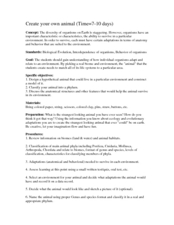Curated OER
The Rainforest Community
Students create a miniature rainforest ecosystem, a terrarium. Students then explain how the continuous flow of energy and food in the ecosystem allows it to sustain itself.
University of Connecticut
Building Your Own Biosphere
On September 26, 1991, four women and four men entered the scientific experiment, Biosphere 2; the doors were sealed for two years in order to study the interactions of a biosphere. In the activity, scholars explore biospheres by...
Curated OER
Adaptations To the Environment
Students design and construct an imaginary animal that is perfectly adapted to a particular type of biome. They give the animal a scientific name, place it in a phylum and write descriptions about its behavior, reproduction, foraging,...
Curated OER
Solid Waste Recycling
Students seek scientific and technological solutions to envrionmental problems. They record class activities in a journal. They identify relationships among living things and their environments.
Science Matters
Basic Needs
Scholars take part in a grand conversation about the basic needs of living things. Working collaboratively, pupils brainstorm and identify similarities to come to the conclusion that the environment meets the needs of all living...
Curated OER
How Is A Frog Able To Swim In The Trees?
Fourth graders explore the interdependence of frogs and trees. They discuss the various things they need everyday to survive. Students select an animal from their local bioregion and research things that animal is dependent upon for...
Curated OER
A Day in the Life of a San Francisco Native Animal
Learners write from an animal's perspective. In this writing lesson students explore the landscape of San Francisco prior to the arrival of the explorers. Learners research animals indigenous to the area.
Curated OER
Create Your Own Animal
Students design and create their own hypothetical animal. In this biology lesson, students identify the factors organisms need to survive. They classify their animals according to its correct phylum.
Curated OER
Animals of the African Savannahs
Students create and describe a new animal that live on the savannah following the characteristics of savannah wildlife discussed in the lesson.
Curated OER
Africa: Animals of the African Savannahs
Students explore animals of the savannah. In this science lesson plan, students discuss the characteristics of animals that live on the savannah. Students create an animal that would be able to live on the savannah.
Curated OER
Overpopulation
Students examine population growth and how it impacts our environment. In this population lesson students identify the causes and consequences of overpopulation.
Curated OER
Desert Animals
Students survive within an ecosystem, an animal must be physically and behaviorally adapted to the conditions of its environment.
Curated OER
Sand, Sand, Everywhere Sand
Students study the physical characteristics of four types of desert regions. In this desert regions lesson plan, students watch a video about deserts and discuss the deserts. Students compare the deserts and research the ways humans have...












